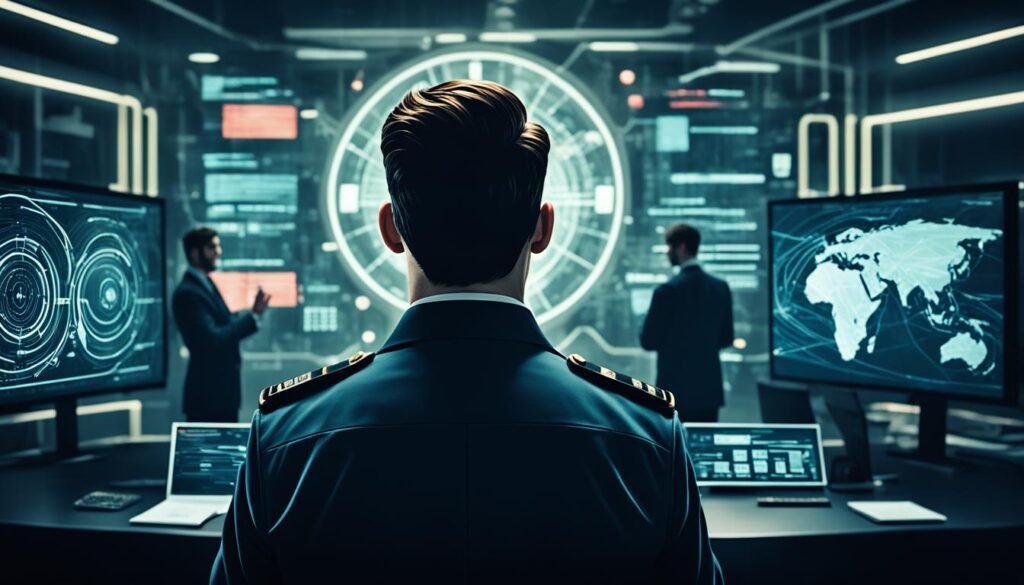Have you ever wondered what goes on in the secretive world of covert operations? The realm of mobile espionage is a mysterious underworld where skilled professionals gather intelligence, protect national security, and carry out missions that remain hidden from the public eye. But what are the methods used in these covert operations? How do these operatives navigate the shadows while gathering crucial information? And what risks do they face in their pursuit of safeguarding our nations? Let’s delve into the covert world of mobile espionage and uncover the truth behind these elusive operations.
Key Takeaways:
- Covert operations play a critical role in intelligence gathering and protecting national security.
- This secretive world relies on skilled professionals who employ various methods to gather information.
- From disguises to high-tech gadgets, covert operatives utilize advanced techniques to remain undetected.
- While the risks involved are high, successful covert operations can prevent terrorist attacks and save lives.
- The use of covert operations raises ethical concerns and challenges the balance between security and individual rights.
The Evolution of Covert Operations
The covert world of espionage and intelligence gathering has undergone significant transformation throughout history. Covert operations have evolved from traditional methods of espionage to encompass modern-day cyber warfare, sabotage, and the utilization of drones.
Espionage, an age-old tactic employed to gather information about enemies or rivals, has played a crucial role in shaping the course of history. During the Cold War, espionage took center stage as superpowers like the United States and the Soviet Union engaged in a high-stakes game of intelligence gathering. Spies operated in the shadows, using their skills to infiltrate enemy territories, gather critical information, and gain the upper hand.
Sabotage, the deliberate act of damaging or destroying something, has also been an integral part of covert operations. Throughout history, sabotage has been utilized to disrupt enemy operations, cripple infrastructure, and create chaos behind enemy lines. From acts of sabotage committed during wartime to covert actions carried out during peacetime, the use of sabotage has demonstrated its effectiveness in achieving specific strategic objectives.
However, with the advent of technology, covert operations have evolved to incorporate cyber warfare and the use of drones. The rise of the digital age has revolutionized the way intelligence is gathered and utilized. Cyber warfare has emerged as a potent tool, allowing states and non-state actors to engage in covert activities that can cripple infrastructure, steal sensitive information, and manipulate global events.
“The digital frontier has provided a new battleground for covert operations. The ability to wage cyber warfare has opened up a whole new dimension of conflict, where nation-states and non-state actors engage in a hidden war of intelligence gathering and sabotage.”
Furthermore, the utilization of drones has become increasingly prominent in covert operations. Drones offer unparalleled surveillance capabilities, enabling operatives to monitor targets from a safe distance and gather valuable information without arousing suspicion. Drones also provide a platform for conducting targeted strikes, eliminating high-value targets, and disrupting enemy operations with precision and efficiency.
The Role of Espionage During the Cold War
During the Cold War, espionage took on a new level of significance as the United States and the Soviet Union engaged in a global power struggle. The espionage activities of intelligence agencies like the CIA and the KGB became legendary, with operatives operating undercover in various nations, gathering critical information, and engaging in covert operations.
One of the most notorious cases of Cold War espionage was the Cambridge Spy Ring, which involved a group of British diplomats who spied for the Soviet Union. Their actions compromised national security and revealed classified information to the enemy.
Espionage played a vital role in shaping the political landscape during this tense period of history. Covert operations conducted by both superpowers helped maintain the delicate balance of power, gather intelligence about the enemy’s capabilities, and prevent large-scale conflicts from escalating into all-out war.
In conclusion, covert operations have evolved over time to adapt to the changing landscape of espionage and intelligence gathering. From traditional methods of espionage during the Cold War to the modern-day utilization of cyber warfare and drones, the covert world continues to push the boundaries of what is possible. As technological advancements continue to reshape the world, covert operations will undoubtedly adapt and evolve, presenting new challenges and opportunities for those involved in the covert realm.
The Art of Disguises and False Identities
Disguises and false identities play a crucial role in covert operations. They enable spies to infiltrate enemy territories without raising suspicion and criminals to commit undetected crimes. This practice is not limited to real-life scenarios but also extends to the world of entertainment, with actors transforming into their characters through the use of disguises. However, the ethical implications of employing disguises and false identities in covert operations need careful consideration, particularly when they are used for deceptive or harmful purposes.
In espionage, the art of disguises allows agents to assume new personas and blend seamlessly into their surroundings. From altering physical appearances with prosthetics to adopting different speech patterns and mannerisms, spies become unrecognizable to their enemies. This tactic grants them access to sensitive information and facilitates successful intelligence gathering.
A notable example of disguise in the realm of espionage is the case of Josephine Baker, an American entertainer who became an undercover operative during World War II. Baker used her fame and charisma to gain access to high-level social circles in Europe. Her performances served as a cover for her espionage work, allowing her to relay vital information to the French Resistance and the Allies.
Similarly, criminals employ false identities to evade law enforcement and carry out illicit activities. They create fictional personas with fraudulent documents, enabling them to operate covertly and avoid detection. False identities provide criminals with a shield of anonymity, making it challenging for authorities to link them to their crimes.
“Disguises and false identities are tools that provide covert operatives with anonymity, allowing them to operate secretly and perform their missions undetected, making them indispensable in the world of illicit activities.”
Beyond the realm of espionage and crime, disguises also find their place in the entertainment industry. In movies and theater, actors embody characters through the use of disguises, transforming their appearances to bring these fictional personas to life. This practice showcases the versatility and creativity of the acting profession.
However, it is important to remain mindful of the ethical concerns surrounding the use of disguises and false identities. While they serve as valuable tools in covert operations, their misuse can lead to deception and harm. Striking a balance between their practicality and ethical implications is crucial in maintaining trust, integrity, and protecting individual rights.
High-Tech Gadgets and Spyware
Modern covert operations rely on high-tech gadgets and spyware to gather intelligence and maintain surveillance. These cutting-edge tools play a crucial role in the intricate world of espionage and intelligence gathering.
From hidden cameras that capture crucial moments to miniature GPS trackers that provide real-time location data, high-tech gadgets have revolutionized covert operations. These devices enable operatives to monitor targets discreetly and extract valuable information.
Spyware, on the other hand, is a type of software that infiltrates devices and collects sensitive data. It can be covertly installed on computers, smartphones, or other electronic devices, allowing surveillance and data extraction without the target’s knowledge.
The use of high-tech gadgets and spyware in covert operations amplifies the intelligence-gathering capabilities of operatives. Operatives can employ these tools to track movements, intercept communications, and access confidential data.
The Role of High-Tech Gadgets
Hidden cameras: These discreet devices are invaluable for covert operations, providing visual evidence and intelligence. They come in various forms, such as button cameras, pen cameras, or even everyday objects like clocks or picture frames.
Miniature GPS trackers: These compact devices enable operatives to track the movement of individuals or objects, allowing precise surveillance and real-time location updates.
Bugging devices: Covert listening devices, commonly known as bugs, are used to secretly record conversations or gather audio information. These devices can be disguised as everyday objects, making them challenging to detect.
The Ethics and Challenges
While high-tech gadgets and spyware offer significant advantages in intelligence gathering, their use raises ethical questions. The invasion of privacy and potential misuse of these tools necessitate responsible and ethical practices in covert operations.
The cost and legality of acquiring and utilizing high-tech gadgets and spyware can pose challenges. The procurement of advanced technology and the adherence to local laws and international regulations require careful consideration and compliance.
Using concealed cameras and covert listening devices, operatives can gather vital information while minimizing the risk of detection. These cutting-edge tools have become an integral part of intelligence gathering, enabling operatives to stay one step ahead of their adversaries.
Responsibility and Effectiveness
The responsible use of high-tech gadgets and spyware is essential to uphold the credibility and effectiveness of covert operations. Ethical guidelines and strict protocols must be in place to ensure that these tools are utilized for legitimate purposes and within the boundaries of the law.
Operatives must also be well-versed in the operation of these devices to maximize their effectiveness. Training programs and continuous skill development are essential to exploit the full potential of high-tech gadgets and spyware.
The Risks and Rewards of Covert Operations

Covert operations involve a level of risk that few are willing to undertake. These operations require individuals to put their lives on the line in pursuit of a mission. The secrecy, danger, and high stakes make covert operations inherently perilous endeavors.
However, the rewards that come with successful covert operations can be monumental. The prevention of terrorist attacks, protection of national security interests, and preservation of human life are just a few examples of the significant impact covert operations can have. These operations play a crucial role in safeguarding nations and ensuring the safety of their citizens.
Successful covert operations require a combination of training, skill, and courage. Individuals involved in covert operations must possess the ability to navigate dangerous situations, adapt quickly, and make split-second decisions under extreme pressure. The risks are immense, but the potential rewards are equally substantial.
| Risks of Covert Operations | Rewards of Covert Operations |
|---|---|
|
|
| The risks associated with covert operations are vast and encompass various aspects, from physical dangers to the potential legal and mental consequences that operatives may face. | The rewards of covert operations are significant, ranging from the prevention of catastrophic events to the preservation of national security and individual lives. |
Covert operations require brave and highly skilled individuals who willingly accept the risks involved in carrying out vital missions. In return, successful operations contribute to the greater good, ensuring the security and well-being of nations and their citizens.
The Ethics of Covert Operations
The use of covert operations brings forth a host of ethical considerations, as they have the potential to encroach upon privacy and human rights. Balancing the need for security with the preservation of individual rights poses a significant challenge. There are legitimate concerns surrounding the legality and morality of certain covert operations, calling for a thoughtful examination of their ethical implications.
“The end justifies the means” – this oft-quoted phrase reflects the underlying ethical dilemma in covert operations. While the primary goal may be to safeguard national security, the methods employed can sometimes infringe upon the rights and privacy of individuals.
One key aspect of the ethical debate surrounding covert operations is the invasion of privacy. Covert operations often involve surveillance and monitoring of individuals, potentially breaching their right to privacy. Striking a balance between gathering intelligence and respecting personal privacy rights is crucial to maintaining a just and democratic society.
Human rights are also at stake when it comes to covert operations. The execution of these operations must adhere to international standards and respect fundamental human rights, even in the pursuit of security objectives. The use of excessive force, torture, or any act that degrades human dignity undermines the ethical foundations of covert operations.
Accountability and transparency play a vital role in upholding ethics in covert operations. It is essential to have mechanisms in place to ensure that these operations are conducted responsibly. Oversight and review processes, both internal and external, can help prevent abuses and hold individuals and organizations accountable for their actions.
The Importance of Ethical Guidelines
Establishing clear ethical guidelines is imperative to navigate the complexities of covert operations. These guidelines should be rooted in international law, human rights principles, and a commitment to democratic values. Ethical considerations should be at the forefront of decision-making processes, guiding every action taken in covert operations.
Moreover, promoting a culture of ethics within intelligence agencies and organizations is essential for ensuring that covert operations are carried out ethically. Comprehensive training programs and ongoing education can equip operatives and officials with the knowledge and awareness necessary to make ethical choices in the field.
The Evolution of Ethical Standards
Over time, ethical standards in covert operations have evolved to reflect the changing nature of global security challenges. The realization that safeguards are necessary to prevent abuses and protect fundamental rights has prompted the establishment of international agreements and conventions to guide the conduct of covert operations.
One such example is the United Nations Universal Declaration of Human Rights, which emphasizes the protection of individual rights and freedoms. Additionally, international bodies and organizations, such as the International Criminal Court and Amnesty International, play a crucial role in monitoring and advocating for ethical conduct in covert operations.
The Way Forward: Ethics in Action
As advancements in technology and intelligence capabilities continue to reshape the landscape of covert operations, it is imperative to prioritize ethics in this realm. Striving for transparency, accountability, and respect for human rights ensures that covert operations serve their intended purpose without sacrificing the values that underpin a just and democratic society.
By upholding ethical standards, covert operations can effectively contribute to national security while respecting the dignity and rights of individuals. It is only through a steadfast commitment to ethics that the delicate balance between security and individual liberties can be maintained.
Covert Operations and the Future of AI

The advent of artificial intelligence (AI) has the potential to revolutionize covert operations. AI-powered technologies can enhance intelligence gathering, surveillance, and decision-making processes in covert operations. By leveraging AI, covert operatives can sift through vast amounts of data, interpret patterns, and identify potential threats more efficiently and accurately. This advanced technology enables quicker response times and improved situational awareness, ultimately enhancing the effectiveness of covert missions.
AI’s impact on intelligence gathering is particularly significant. Machine learning algorithms can analyze and prioritize data, enabling operatives to extract actionable insights and identify patterns that human operators may miss. The ability to process and analyze real-time information can provide valuable intelligence during critical operations, facilitating informed decision-making and improving mission outcomes.
“AI offers unprecedented opportunities in covert operations. It not only enhances our ability to gather intelligence but also provides new avenues for surveillance and response. However, it is crucial to approach the use of AI in covert operations with caution and ethical considerations.”
Despite the potential benefits, the use of AI in covert operations raises concerns about the ethical implications and consequences of autonomous systems. Autonomous AI systems have the capacity to make decisions and take actions without direct human intervention. This autonomy poses challenges in terms of accountability, legality, and the potential for unintended consequences. It is essential to establish guidelines and frameworks to ensure responsible and ethical use of AI in covert operations, balancing the need for effectiveness with considerations for privacy, human rights, and potential collateral damage.
The Role of AI in Covert Surveillance
AI-powered surveillance systems have the capability to analyze vast amounts of data collected through various sources, including drones, satellites, and social media platforms. These systems can automatically detect suspicious activities, identify targets of interest, and track individuals’ movements over time. Furthermore, AI algorithms can learn from past behavior and adapt to changing circumstances, enhancing their ability to identify potential threats and suspicious patterns in real-time.
The integration of facial recognition technology with AI-powered surveillance systems offers advanced capabilities for covert operatives. Facial recognition algorithms can analyze vast databases of images and match them to individuals of interest, providing valuable information for ongoing investigations. However, the use of facial recognition technology also raises concerns about privacy and civil liberties, necessitating careful regulation and oversight.
When it comes to intelligence gathering, AI can automate the process of sifting through massive volumes of data, including intercepted communications, social media, and open-source intelligence. By applying natural language processing and sentiment analysis, AI algorithms can extract relevant information and identify potential threats or emerging trends. This enables covert operatives to focus their efforts on actionable intelligence, optimizing their time and resources.
Achieving Ethical AI in Covert Operations
As AI continues to evolve and play a larger role in covert operations, it is essential to establish ethical frameworks and guidelines. Transparency, accountability, and human oversight are crucial aspects that must accompany the use of AI in sensitive operations. Covert operatives must adhere to strict protocols and regulations to ensure that the use of AI aligns with legal and ethical standards.
Additionally, regular audits and evaluations of AI systems are necessary to identify potential biases or errors that could compromise the integrity of covert operations. Human operators should retain the ultimate decision-making authority, with AI serving as a valuable tool to augment their capabilities, rather than replacing human judgment entirely.
| Benefits of AI in Covert Operations | Concerns and Considerations |
|---|---|
|
|
Covert Operations and Democracy
Covert operations, although necessary to protect national security interests, can also pose a potential threat to democracy. The secrecy surrounding these operations raises crucial questions regarding accountability and oversight. Striking a balance between the need for covert operations and the principles of democracy presents a complex challenge that demands careful consideration and transparency.
In a democratic society, transparency and accountability are fundamental for maintaining the trust of the citizens. However, covert operations, by their very nature, require secrecy to effectively carry out their objectives. The dilemma arises when the need for secrecy clashes with the principles of democracy, raising concerns about the potential abuse of power and violation of civil liberties.
Democracy places a significant emphasis on public participation and the protection of individual rights. Covert operations, on the other hand, may involve actions that could infringe upon these rights in the name of national security. It becomes a delicate balancing act to safeguard both the democratic values we hold dear and the safety and security of the nation.
Accountability is another crucial aspect in the context of covert operations. Without appropriate oversight, covert operations run the risk of becoming unchecked exercises of power. In a democratic society, it is vital to have mechanisms in place to ensure that covert operations are conducted with integrity, adhering to the rule of law and respecting civil liberties.
The Challenges of Balancing Security and Democracy
One of the key challenges in reconciling covert operations with democracy is preserving the rule of law. It is essential to establish clear legal frameworks and oversight mechanisms to prevent abuses of power and ensure that covert operations align with democratic principles.
“Ensuring a transparent and accountable framework for covert operations is crucial to protect both national security and democratic ideals.”
– John Adams, National Security Analyst
Moreover, fostering a culture of transparency and public trust is essential. Engaging in open dialogue about the necessity of covert operations, while respecting the need for secrecy to protect vital interests, can help build confidence and ensure democratic legitimacy.
Striving for Transparency and Oversight
Efforts must be made to strike the delicate balance between the need for covert operations and the values of democracy. Enhanced oversight and accountability mechanisms can help mitigate the risks associated with covert operations.
Government agencies responsible for covert operations should be subject to robust oversight by legislative bodies, independent committees, and judicial review. This ensures that actions are scrutinized, and potential abuses are identified and remedied.
Implementing strong safeguards, such as strict guidelines and protocols, can help minimize the potential for unauthorized actions and abuses. Regular reporting and audits can further enhance transparency and accountability.
The Global Nature of Covert Operations
In today’s interconnected world, covert operations have transcended national boundaries and become a global phenomenon. From intelligence gathering to cyber warfare, the reach of covert activities extends to various countries around the world. No longer limited to certain nation-states, these operations have been democratized and are utilized by actors from different regions. The global nature of covert operations underscores the need for international cooperation and coordination to effectively address emerging threats and maintain global security.
Covert operations, such as espionage and sabotage, have historically been associated with the activities of powerful nation-states. However, advancements in technology and the increasing interconnectedness of our world have leveled the playing field. Non-state actors, including insurgent groups, criminal syndicates, and private individuals, now have the means to engage in covert operations on a global scale.
One of the key areas where the global nature of covert operations is evident is in cyber warfare. Cyber attacks can originate from any part of the world and target entities in different countries. Hackers can launch sophisticated attacks remotely, exploiting vulnerabilities in digital infrastructure to infiltrate systems, steal sensitive data, or disrupt critical services.
“Cyber warfare knows no borders. It is a borderless battlefield where adversaries can strike from anywhere and target anyone.”
The interconnectedness of our digital infrastructure means that a cyber attack targeting one country can have ripple effects that span the globe. This global interdependency necessitates international cooperation to prevent and respond to cyber threats effectively.
Additionally, intelligence gathering is another area where the global nature of covert operations is apparent. The gathering of information transcends national borders as intelligence agencies seek to understand the actions and intentions of actors from around the world. Cooperative efforts between intelligence agencies, sharing information and expertise, are crucial in combating transnational threats.
The table below highlights some notable examples of covert operations in recent history:
| Covert Operation | Scope | Description |
|---|---|---|
| Operation Paperclip | Global | A covert program by the United States to recruit German scientists after World War II, with the aim of gaining a technological advantage during the Cold War. |
| Stuxnet | Global | A sophisticated cyberattack jointly conducted by the United States and Israel, targeting Iran’s nuclear program. |
| Snowden Leaks | Global | Edward Snowden’s disclosure of classified information revealed the global extent of intelligence gathering activities conducted by the National Security Agency (NSA) of the United States. |
| Operation Wrath of God | Global | An Israeli covert operation to track down and assassinate individuals involved in the 1972 Munich Olympics massacre. |
The global nature of covert operations necessitates international collaboration, shared intelligence, and coordinated efforts to counter emerging threats effectively. As the world becomes increasingly interconnected, it is crucial for governments, intelligence agencies, and cybersecurity organizations to work together to address the challenges posed by covert operations.
The Threat of Espionage and Cyber Warfare
Espionage and cyber warfare pose significant threats to national security. These covert activities involve the gathering of intelligence and the utilization of advanced technology to carry out cyber attacks. The consequences of espionage and cyber warfare can be far-reaching, impacting governments, organizations, and individuals alike.
The Covert Gathering of Intelligence
Espionage, the act of gathering information through covert means, has been used throughout history to gain an advantage over adversaries. Spies operating under the cloak of secrecy infiltrate target organizations and countries to access sensitive information. This intelligence gathering can provide valuable insights into a nation’s military capabilities, economic strategies, and political plans.
“Espionage is the world’s second-oldest profession.”
The Rising Threat of Cyber Warfare
In recent years, cyber warfare has emerged as a significant threat to national security. State-sponsored hackers and malicious actors leverage advanced cyber techniques to disrupt critical infrastructure, steal sensitive information, and wage digital warfare. Cyber attacks can target government agencies, defense systems, financial institutions, and businesses, causing widespread disruption and economic loss.
The Need for a Multi-Pronged Approach
Protecting against espionage and cyber warfare demands a multi-faceted approach that encompasses robust cybersecurity measures, intelligence sharing, and collaboration among governments and organizations. To counter espionage, security agencies must enhance their counterintelligence capabilities to identify and neutralize hostile spies. In the realm of cyber warfare, comprehensive cybersecurity protocols, threat intelligence sharing, and proactive defense strategies are crucial to detect and deter cyber threats.
“Cooperation and collaboration among nations are essential in combating the growing threats of espionage and cyber warfare.”
The Role of Intelligence Agencies
Intelligence agencies play a pivotal role in both detecting and preventing espionage and cyber warfare. Through the gathering and analysis of intelligence, these agencies provide vital information to decision-makers, enabling them to make informed choices in the interest of national security. Effective intelligence cooperation allows countries to share vital intelligence, insights, and expertise to counter evolving espionage and cyber threats.
The Ongoing Battle Against Covert Operations
Countering covert operations requires constant vigilance and proactive measures. Governments and organizations must invest in intelligence capabilities, enhance cybersecurity, and develop countermeasures to detect and prevent covert operations. The ongoing battle against covert operations necessitates adaptability and the ability to stay one step ahead of adversaries.
Covert operations pose significant challenges to national security and require comprehensive efforts to combat them effectively. Here are some key countermeasures that are essential in this ongoing battle:
1. Enhanced Intelligence Gathering
Intelligence gathering plays a crucial role in countering covert operations. By strengthening intelligence capabilities, governments and organizations can identify and assess potential threats, gather critical information, and develop proactive strategies to neutralize covert activities.
2. Robust Cybersecurity Measures
Covert operations often involve the use of sophisticated cyber techniques to infiltrate systems and networks. By implementing robust cybersecurity measures, such as firewalls, encryption, and advanced threat detection systems, it is possible to minimize vulnerabilities and protect sensitive information from unauthorized access.
3. Collaboration and Information Sharing
Coordinating efforts and sharing information among governments, intelligence agencies, and international partners is essential in the battle against covert operations. By working together, stakeholders can leverage collective expertise and resources to detect and disrupt covert activities on a global scale.
4. Training and Education
A well-trained and knowledgeable workforce is critical to effectively counter covert operations. Providing comprehensive training and education to individuals involved in intelligence, law enforcement, and cybersecurity helps enhance their understanding of covert tactics, emerging threats, and the strategies to mitigate them.
5. Technological Innovation
Advancements in technology offer both challenges and opportunities in countering covert operations. Developing innovative tools and techniques, such as artificial intelligence (AI), machine learning, and predictive analytics, can help detect patterns, identify potential threats, and strengthen overall countermeasures.
The battle against covert operations is an ongoing fight that requires constant adaptation and innovation. By investing in intelligence capabilities, enhancing cybersecurity, fostering collaboration, and embracing technological advancements, governments and organizations can strengthen their defenses and stay one step ahead in safeguarding national security interests.
Conclusion
The covert world of mobile espionage is a fascinating and ever-evolving domain that plays a crucial role in intelligence gathering, protecting national security interests, and countering emerging threats. Covert operations are instrumental in acquiring vital information through various methods, such as human intelligence, signals intelligence, and imagery intelligence. These operations are conducted with utmost secrecy, relying on cover and concealment, and often incorporating advanced technology to accomplish their objectives.
However, as with any powerful tool, ethical considerations, privacy concerns, and inherent risks necessitate a delicate balance between security and individual rights. Transparency and accountability are essential to ensure the responsible conduct of covert operations. Striking this balance becomes even more critical as technology advances, presenting new challenges and opportunities for intelligence agencies.
As we look to the future, the world of covert operations will continue to evolve alongside technological advancements. The increasing use of artificial intelligence and advanced surveillance technology will revolutionize intelligence gathering and decision-making processes. Continual investment in intelligence capabilities, cybersecurity measures, and countermeasures will be crucial to stay one step ahead of adversaries.
In a globalized and interconnected world, international cooperation and coordination among nations are paramount in addressing the growing threats of espionage and cyber warfare. By sharing intelligence and best practices, governments and organizations can enhance their collective ability to counter covert operations and protect national security interests. Through the ongoing battle against covert operations, we strive to maintain a balance between safeguarding our societies and respecting the values of democracy, privacy, and human rights.


